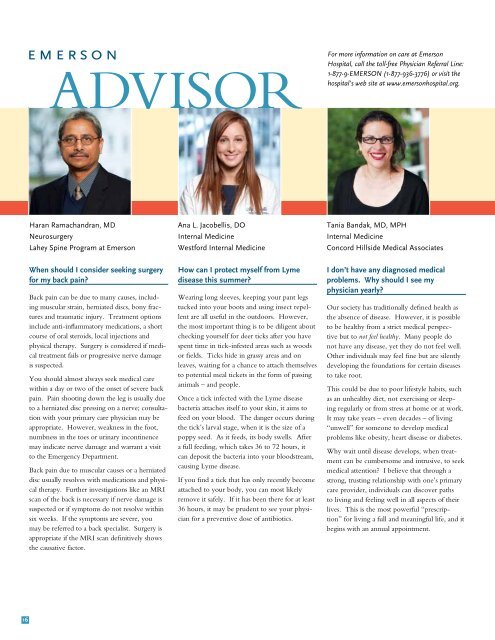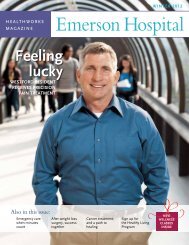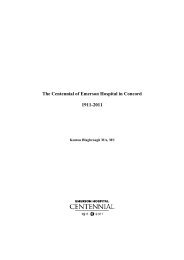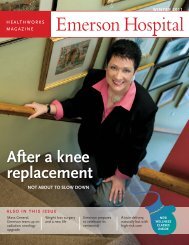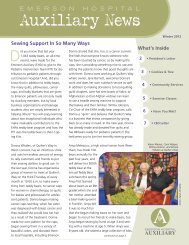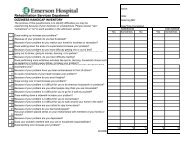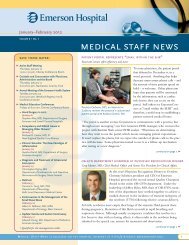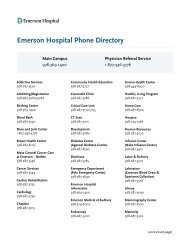Download PDF - Emerson Hospital
Download PDF - Emerson Hospital
Download PDF - Emerson Hospital
You also want an ePaper? Increase the reach of your titles
YUMPU automatically turns print PDFs into web optimized ePapers that Google loves.
emerson<br />
ADVISOR<br />
For more information on care at <strong>Emerson</strong><br />
<strong>Hospital</strong>, call the toll-free Physician Referral Line:<br />
1-877-9-EMERSON (1-877-936-3776) or visit the<br />
hospital’s web site at www.emersonhospital.org.<br />
Haran Ramachandran, MD<br />
Neurosurgery<br />
Lahey Spine Program at <strong>Emerson</strong><br />
Ana L. Jacobellis, DO<br />
Internal Medicine<br />
Westford Internal Medicine<br />
Tania Bandak, MD, MPH<br />
Internal Medicine<br />
Concord Hillside Medical Associates<br />
When should I consider seeking surgery<br />
for my back pain?<br />
Back pain can be due to many causes, including<br />
muscular strain, herniated discs, bony fractures<br />
and traumatic injury. Treatment options<br />
include anti-inflammatory medications, a short<br />
course of oral steroids, local injections and<br />
physical therapy. Surgery is considered if medical<br />
treatment fails or progressive nerve damage<br />
is suspected.<br />
You should almost always seek medical care<br />
within a day or two of the onset of severe back<br />
pain. Pain shooting down the leg is usually due<br />
to a herniated disc pressing on a nerve; consultation<br />
with your primary care physician may be<br />
appropriate. However, weakness in the foot,<br />
numbness in the toes or urinary incontinence<br />
may indicate nerve damage and warrant a visit<br />
to the Emergency Department.<br />
Back pain due to muscular causes or a herniated<br />
disc usually resolves with medications and physical<br />
therapy. Further investigations like an MRI<br />
scan of the back is necessary if nerve damage is<br />
suspected or if symptoms do not resolve within<br />
six weeks. If the symptoms are severe, you<br />
may be referred to a back specialist. Surgery is<br />
appropriate if the MRI scan definitively shows<br />
the causative factor.<br />
How can I protect myself from Lyme<br />
disease this summer?<br />
Wearing long sleeves, keeping your pant legs<br />
tucked into your boots and using insect repellent<br />
are all useful in the outdoors. However,<br />
the most important thing is to be diligent about<br />
checking yourself for deer ticks after you have<br />
spent time in tick-infested areas such as woods<br />
or fields. Ticks hide in grassy areas and on<br />
leaves, waiting for a chance to attach themselves<br />
to potential meal tickets in the form of passing<br />
animals – and people.<br />
Once a tick infected with the Lyme disease<br />
bacteria attaches itself to your skin, it aims to<br />
feed on your blood. The danger occurs during<br />
the tick’s larval stage, when it is the size of a<br />
poppy seed. As it feeds, its body swells. After<br />
a full feeding, which takes 36 to 72 hours, it<br />
can deposit the bacteria into your bloodstream,<br />
causing Lyme disease.<br />
If you find a tick that has only recently become<br />
attached to your body, you can most likely<br />
remove it safely. If it has been there for at least<br />
36 hours, it may be prudent to see your physician<br />
for a preventive dose of antibiotics.<br />
I don’t have any diagnosed medical<br />
problems. Why should I see my<br />
physician yearly?<br />
Our society has traditionally defined health as<br />
the absence of disease. However, it is possible<br />
to be healthy from a strict medical perspective<br />
but to not feel healthy. Many people do<br />
not have any disease, yet they do not feel well.<br />
Other individuals may feel fine but are silently<br />
developing the foundations for certain diseases<br />
to take root.<br />
This could be due to poor lifestyle habits, such<br />
as an unhealthy diet, not exercising or sleeping<br />
regularly or from stress at home or at work.<br />
It may take years – even decades – of living<br />
“unwell” for someone to develop medical<br />
problems like obesity, heart disease or diabetes.<br />
Why wait until disease develops, when treatment<br />
can be cumbersome and intrusive, to seek<br />
medical attention? I believe that through a<br />
strong, trusting relationship with one’s primary<br />
care provider, individuals can discover paths<br />
to living and feeling well in all aspects of their<br />
lives. This is the most powerful “prescription”<br />
for living a full and meaningful life, and it<br />
begins with an annual appointment.<br />
16


